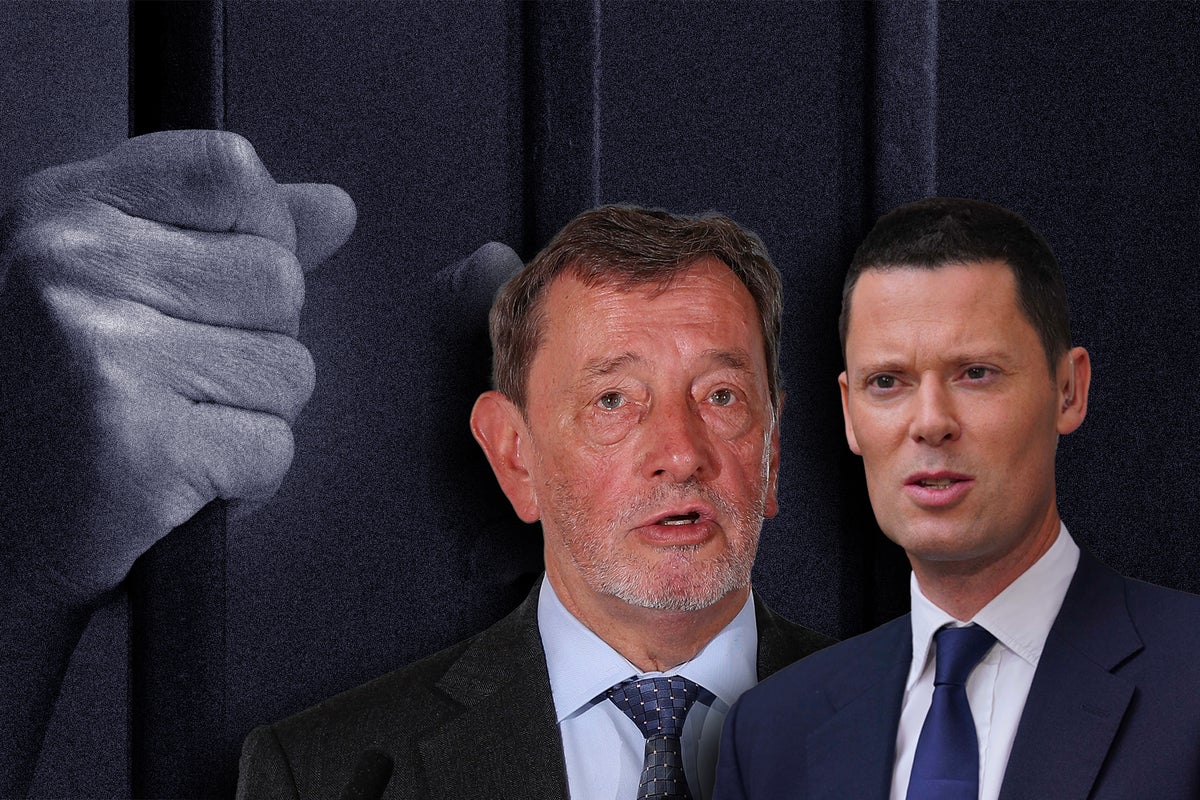Latest News
Calls to end the ‘living nightmare’ of indefinite jail terms ahead of crunch Lords debate
Published
2 years agoon
By
cldhaz
For free real time breaking news alerts sent straight to your inbox sign up to our breaking news emailsSign up to our free breaking news emails
Mental health, human rights and criminal justice experts have made a joint plea for parliament to end the “living nightmare” of indefinite jail terms, following a series of revelations by The Independent.
Thousands of prisoners have been left languishing in jail for years longer than their minimum tariff, and with no hope of release, under imprisonment for public protection (IPP) sentences – which were scrapped more than a decade ago amid human rights concerns.
They include tragic cases highlighted by The Independent such as those of Wayne Bell, who has served more than 16 years for stealing a bike; Thomas White, who is still in prison 11 years after he stole a mobile phone; and Shaun Lloyd, who fears he could be hauled back to jail for the fourth time for stealing a phone almost 20 years ago.
The coalition of 11 leading voices, led by the Prison Reform Trust, has come together ahead of a crunch debate in the House of Lords this week, in which peers will review a series of amendments to the Victims and Prisoners Bill, including one calling for all IPP prisoners to be resentenced.
Organisations that have joined the call for action include the Royal College of Psychiatrists, the British Psychological Society, Amnesty International, Justice, Liberty, the United Group for Reform of IPP, the Probation Institute, the Centre for Crime and Justice Studies, Inquest, the Howard League for Penal Reform, and the Prison Reform Trust.
A cross-party group of peers – including David Blunkett, who admits he regrets introducing the sentence as home secretary in 2005 – have also tabled 17 amendments to help those affected by IPPs, which will be debated on Monday.
A cross-party group of peers, including David Blunkett, have tabled 17 amendments to help IPP prisoners
(Getty/iStock/PA)
IPP sentences were scrapped in 2012, but not retrospectively, leaving almost 3,000 inmates trapped in prison with no release date – with more than 700 of them having served 10 years longer than their minimum tariff.
More than 80 IPP prisoners are known to have taken their own lives – including the seven whose self-inflicted deaths were revealed by The Independent last year.
Dr Josanne Holloway, chair of the forensic faculty at the Royal College of Psychiatrists, said the bill is a chance to make “real progress in ending one of the biggest injustices of our criminal justice system”.
“Serving an IPP sentence can have a devastating impact on someone’s mental health,” she said. “They have all served longer than the usual tariff for the offence, often for continuing mental health difficulties, and live with the daily uncertainty of not knowing if their sentence will ever end – a hardship which is worsened by the fact that the very sentence they are serving is unjust.”
Reforms are also backed by the British Psychological Society – which said the sentence leaves people in a “chronic state of anxiety and hopelessness”.
The amendments tabled include a provision to carry out a resentencing exercise – which was the principal recommendation of an inquiry carried out by the justice committee in 2022.
The government has so far refused to resentence prisoners, despite a “worrying rise” in self-inflicted deaths reported in prisons as inmates lose hope. Instead, justice secretary Alex Chalk proposed reducing the IPP licence period from 10 to three years, in plans announced last year.
While the licence review is a “welcome step”, it does not go far enough to end the “cruel, inhuman and degrading punishment”, campaigners added. Tom Southerden, Amnesty UK’s legal programme director, said: “IPP sentences are a stain on the justice system and were found by the European Court to violate fundamental human rights as long ago as 2012.
Shaun Lloyd has been recalled three times under an IPP sentence for stealing a phone in 2005
(Shirley Debono/The Independent)
“For the thousands of people still stuck in this system it has become a living nightmare. It’s clearly past time for a root and branch reform of how the justice system deals with these people, and while the government’s proposals in the Victims and Prisoners Bill are a welcome step, they don’t go nearly far enough.”
Tyrone Steele, deputy legal director at Justice, said the sentences are “indefensible”, urging peers to “help end this shameful chapter in our legal history”.
Under the controversial sentences, which were introduced by New Labour in 2005 but scrapped seven years later, people were handed a minimum jail term without a specified maximum term.
After completing their minimum tariff, IPP inmates must apply to the Parole Board and meet stringent criteria in order to be released – including not suffering from mental health problems – to prove that they are no longer a risk to the public.
Other reforms tabled by peers include measures to improve the sentence progression of IPP prisoners, and a new power of executive release of recalled IPP prisoners.
They also propose further easing of the strict licence conditions, which can see people recalled multiple times for even minor breaches – such as in the case of Mr Lloyd, who has already been recalled to prison three times for taking a phone when he was 18.
Backing the calls for reform, Inquest revealed it has so far supported 28 families of prisoners who died while serving an IPP sentence, such as Tommy Nicol, who was two years over his minimum tariff for stealing a car when he died by suicide in 2015. His sister Donna Mooney campaigns with the United Group for Reform of IPP (UNGRIPP).
“Every day we hear about the extreme damage the IPP sentence does to people serving the sentence and their families,” an UNGRIPP spokesperson said. “This treatment has been allowed to continue for more than 18 years. The torture of the IPP needs to stop. While many of these amendments do not go far enough, they are a step closer to ending the injustice of the IPP sentence.”
Justice secretary Alex Chalk has proposed a reduction in the licence period for IPP prisoners – but has not accepted a recommendation to resentence them
(PA Wire)
Pia Sinha, chief executive of the Prison Reform Trust, acknowledged that Mr Chalk had gone further than his predecessors to help IPP prisoners, but called for more “radical” reform. She told The Independent: “The injustice faced by thousands of IPP prisoners and their families requires more radical action still.
“An influential cross-party group of peers has tabled a series of amendments to the Victims and Prisoners Bill to take forward reforms in a number of important areas. With the backing of organisations from across the mental health, human rights and criminal justice sectors, we hope peers will be persuaded to support these amendments and help bring a distressing chapter in British legal history to a close.”
A Ministry of Justice spokesperson said: “We have reduced the number of unreleased IPP prisoners by three-quarters since we scrapped the sentence in 2012, with a 12 per cent fall in the last year alone where the Parole Board deemed prisoners safe to release.
“We have also taken decisive action to curtail licence periods, and continue to help those still in custody to progress towards release, including improving access to rehabilitation programmes and mental health support.”


Russians describe senior officers ordering brutal execution of fellow soldiers

The Latest: Northeast snowstorm forces millions to stay home, disrupts flights and closes schools

Andrew Mountbatten-Windsor latest: Government backs files release as ex-duke accused of ‘self-enriching hustle’

Artsakh has no natural gas for 4th day, negotiations with Azerbaijan continue

Italy’s Palermo unanimously recognizes Artsakh independence

Captured in Artsakh terrorist says they were promised $ 100 for each severed head of ‘kafir’

NEWS.am latest, 03.11.20: Nagorno-Karabakh authorities have evidence of Azerbaijan using prohibited weapons in Artsakh

Captured in Artsakh terrorist says they were promised $ 100 for each severed head of ‘kafir’

